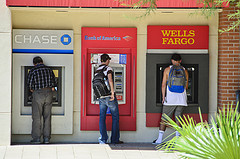4 Ways You Might Save By Ditching Your Mega Bank
Image courtesy of (eric_harvieux)FREE CHECKING
Many of the large banks, which hold around half of consumer deposits in the U.S., haven’t even tried to pretend like they care about the usually small accounts held by people with free checking accounts. In fact, only 39% of banks in the U.S. still offer free checking, compared to 72% for credit unions.
So if you’re one of the many people who just need a secure place to put your cash when you’re not using it, you have a much wider variety of options at your disposal by going with a credit union.
LOWER MONTHLY FEES
Earlier this year, our cohorts at Consumer Reports looked at monthly fees on non-interest checking accounts. At the largest 10 banks, customers pay an average of $10.27/month, just for basic checking.
When you go to banks with less than $4 billion in deposits, that average drops to $7.45, and decreases even further at credit unions.
Oddly enough, the more assets a credit union has, the lower its monthly fee is likely to be. CR found that the average fee for the 10 largest unions was $6, while it was $6.91 for credit unions under the $4 billion line.
LOWER INTEREST RATES
CR also found that community banks had, on average, interest rates below the national average on credit cards, home-equity loans, and lines of credit.
SAVING ON ATM FEES
While many of the mega banks advertise how they have all sorts of branches and ATMs around the country, they fail to mention that many credit unions are part of a shared ATM network that may actually be more convenient to use, depending on your location.
Furthermore, some credit unions and community banks will refund non-network ATM fees.
“The real reason why many consumers are staying put at the big banks, despite dissatisfaction, could be that the process of switching banks seems too complicated,” writes Suzanne Martindale of Consumers Union’s Defend Your Dollars.
To that end, Consumers Union has put together this step-by-step guide [PDF] to help steer customers through the occasionally daunting process of switching banks.
Want more consumer news? Visit our parent organization, Consumer Reports, for the latest on scams, recalls, and other consumer issues.


